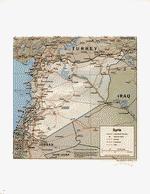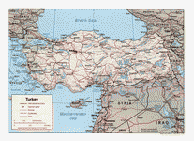December 2012
Foreign correspondents were released from five days captivity in Syria to freedom in Turkey. Syria, slightly larger than North Dakota, lies along the Mediterranean Sea, between Lebanon and Turkey. Turkey, slightly larger than Texas lies partly in Southeastern Europe and mostly in Southwestern Asia, shares its southern border with Syria and Iraq.
Syria has an estimated population of 22,530,746. Its capital, Damascus (located at an oasis fed by the Barada River), is thought to be one of the world's oldest continuously inhabited cities. The majority of Syrians (74%) identify as Sunni Muslim, 16 % identify with other Muslim sects (such as Alawite, Druze), Christian of various denominations and Jews make up the rest of the population. Over 90% of the population are ethnic Arabs. Arabic is the official language, although Kurdish, Armenian, Aramaic, and Circassian are also widely understood.
Syria is mostly desert with hot, dry, sunny summers and mild, rainy winters along coast; cold weather with snow or sleet periodically occurs in Damascus. Its terrain is primarily semiarid and desert plateau with a narrow coastal plain and mountains in west. Natural resources of Syria include: petroleum, phosphates, chrome and manganese ores, asphalt, iron ore, rock salt, marble, gypsum, and hydropower. Dust storms and sandstorms are the primary natural hazards facing Syria.
Turkey has an estimated population of 79,749,461. Its capital, Ankara is the second most populous city (3.85 million); Istanbul is its most populous city (10.38 million). Over 99% of Turks are Muslim (mostly Sunni), the other 0.2% of the population is mostly Christian and Jewish. Ethnically, Turkey is comprised of people identifying as Turkish 70-75% and Kurdish 18%; the remaining 7-12% are of varying minorities. Turkish is the official language of Turkey, however Kurdish is also widely understood.
Turkey controls the strategic Turkish Straits (Bosporus, Sea of Marmara, and the Dardanelles) that link the Black and Aegean Seas. Mount Ararat in the far eastern portion of the country is the legendary landing place of Noah's ark. Its climate is temperate with hot, dry summers and mild, wet winters. The terrain of Turkey contains a high central plateau (Anatolia), a narrow coastal plain, and several mountain ranges. Its natural resources include: coal, iron ore, copper, chromium, antimony, mercury, gold, barite, borate, emery, feldspar, limestone, magnesite, marble, perlite, pumice, pyrites, clay, arable land, and hydropower. The most prevalent natural hazard facing Turkey is severe earthquakes.
CIA World Factbook, 12/2012


